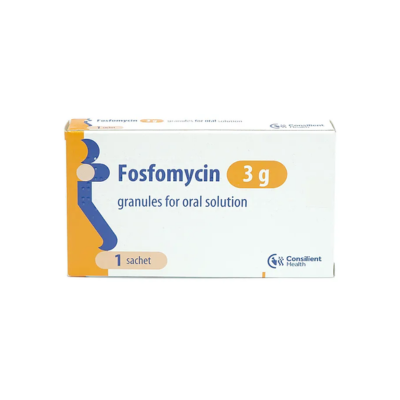Fosfomycin
- Single-Dose Treatment
- Fast Symptom Relief
- Broad-Spectrum Effectiveness
- UK Regulated Pharmacy
Fosfomycin
Category:CystitisFosfomycin is an effective single-dose antibiotic used to treat urinary tract infections (UTIs) like cystitis in women. It works by eliminating bacteria and preventing reinfection, with most symptoms improving within 2 to 3 days.
This medication is only for women and not licensed for men.
Fetching Data...
All inclusive services
No extra costs
Free tracked delivery
Delivered in plain packaging
Prescription included
No consultation charges
Frequently Asked Questions for Fosfomycin
What is Fosfomycin?
Fosfomycin is an antibiotic used to treat urinary tract infections (UTIs), including cystitis, in women. It is prescribed primarily for uncomplicated UTIs, meaning infections in otherwise healthy women who are not pregnant. Fosfomycin is an alternative to MacroBID (nitrofurantoin), which is the first-line treatment for cystitis based on national guidelines. This antibiotic is available in a single-dose sachet containing a powdered formula that is mixed with water and taken as a drink.
How Does Fosfomycin Work?
Fosfomycin is a broad-spectrum antibiotic that works by eliminating bacteria responsible for UTIs and preventing their regrowth. It does this by disrupting bacterial cell wall production, stopping the infection from spreading further. Fosfomycin is rapidly absorbed and begins working soon after ingestion, with most people experiencing symptom relief within 2 to 3 days. To ensure effectiveness, it is best to take it on an empty stomach, preferably before bed after emptying the bladder.
How to Take Fosfomycin
- The standard dose for adult women is one 3g sachet taken as a single dose.
- Empty the entire contents of the sachet into a glass of cold or room temperature water.
- Stir until the powder dissolves completely and drink it immediately.
- Avoid consuming the powder on its own without water.
- While it can be taken with or without food, it is most effective when taken on an empty stomach or at least two hours after eating.
Most women do not require a second dose, but if symptoms persist, consult a doctor for further guidance.
Side Effects
Fosfomycin is generally well tolerated, but like all medications, it may cause some side effects.
-
Common side effects (affecting up to 1 in 10 people):
- Headache.
- Nausea or feeling sick.
- Dizziness or drowsiness.
- Diarrhoea or stomach discomfort.
-
Less common but more serious side effects:
- Allergic reactions – Seek immediate medical help if you experience difficulty breathing, swelling of the face, lips, or throat, or a widespread rash.
- Severe stomach pain or persistent diarrhoea – Contact a doctor if symptoms worsen or do not resolve.
- Painful urination or blood in urine or stools – May require further medical assessment.
Side effects are usually mild and temporary, resolving on their own without stopping treatment. However, if symptoms are severe or persistent, seek medical advice.
Warnings and Precautions
Fosfomycin may not be suitable for everyone, and certain individuals should consult a doctor before taking it.
Do NOT take Fosfomycin if you:
- Are allergic to fosfomycin or any of its ingredients.
- Have severe kidney problems.
- Are under 12 years old.
Consult a doctor before taking Fosfomycin if you:
- Have ever had severe diarrhoea after taking antibiotics.
- Have a sugar intolerance, as fosfomycin contains certain sugars.
- Are pregnant, planning to conceive, or breastfeeding.
Possible Drug Interactions:
Fosfomycin may interact with:
- Metoclopramide (anti-nausea medication) – May reduce the effectiveness of fosfomycin.
- Hormonal contraceptives – While fosfomycin is unlikely to affect birth control, it is recommended to use extra protection (e.g., condoms) during treatment.
Always inform your doctor or pharmacist of any medications you are currently taking before starting fosfomycin.
